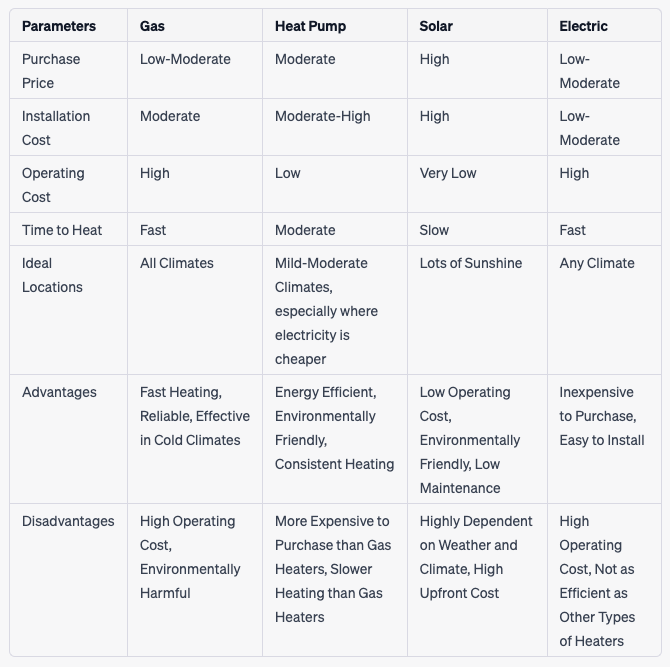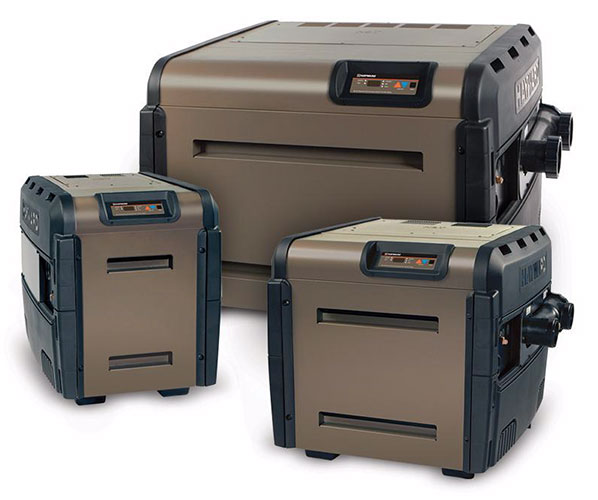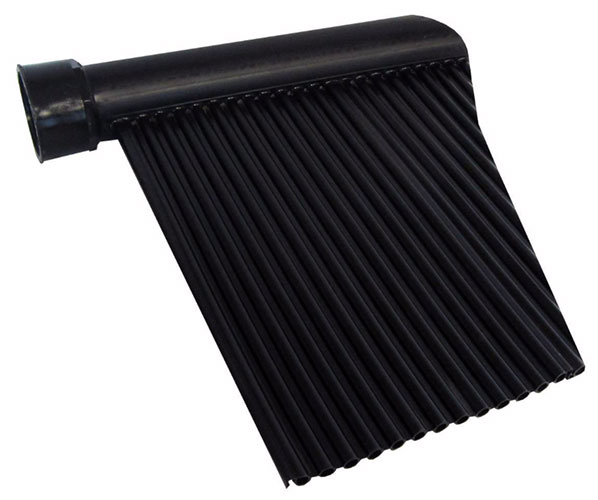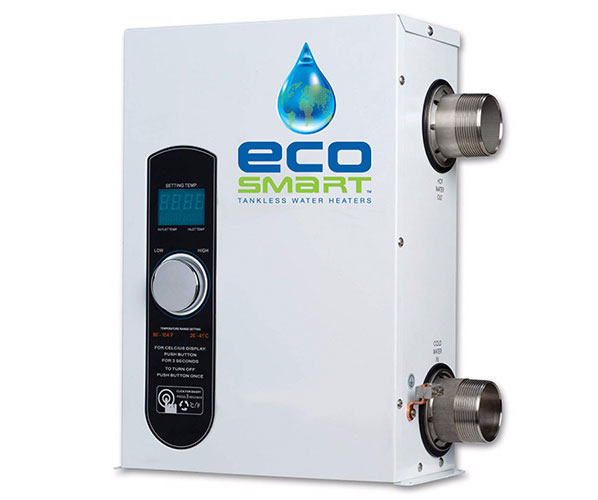- Salt Water Pool and Spa
- Inground Pool Heaters
Inground Pool Heaters
Inground pool heaters provide the luxury of being able to swim during the day, evening and into the cooler months of the year with constant warm and inviting temperatures. There is nothing more disappointing than jumping into a cold pool especially when the weather isn't the best. A pool heater can help and can even extend your pool season by as much as several months and in some cases increase the water temperature in a large pool in minutes.
Inground pool heaters come in many shapes and sizes to help you to keep your pool water warm all season long. The technology available in todays top rated pool heaters allow you to heat your pool for a lot less and with so many variables to consider it can be difficult to choose the right one. We'll go over the different types of pool heaters and include the basic advantages and disadvantages as well as important factors like; average purchase price, operating cost, time to heat and more.
Types of Inground Pool Heaters
There are 4 types of inground pool heaters that you can choose from to heat your pool, each with their own unique pros and cons. They are each designed to operate most efficiently under certain conditions so it's very helpful to understand how each type of heater works. The specifics of each type of heater are listed so you can make comparisons between the various types to find the best one for your specific pool, water volume, geographic location and operating budget.
- Gas Pool Heaters
- Heat Pump Pool Heaters
- Solar Powered Pool Heaters
- Electric Pool Heaters
1. Gas Pool Heaters
A gas pool heater is the most popular method of heating pools and spas in cooler climates because of their versatility and affordability. A gas heater is fuelled by either natural gas or propane delivered through an existing natural gas line or propane canister tank. Gas heaters can heat the water to a desired temperature in as little as a few hours, making them ideal for quickly heating pools, spas and hot tubs.
They work by burning the fuel in a combustion chamber and transferring the heat generated by the process to the pool water. As the water flows through a series of coils inside the heater, the water is heated and returned to the pool at a higher temperature. You can expect consistent heating when outdoor temperatures are cold or fluctuating in the spring and fall months. They are affordably priced, it's easy to maintain a gas pool heater but they are the most expensive to operate especially if you live in a cold climate.
|
Time to Heat |
Fast |
2. Heat Pump Pool Heaters
A pool heat pump heater will keep your pool heated or cooled for as much as 85% cheaper than gas or electric powered inground pool heaters. They utilize electricity to transfer heat from the surrounding air or ground to the pool water. The operation is similar to an air conditioner but in reverse: they use a compressor and refrigerant to extract heat from the outside air or ground, and then transfer that heat to the water.
Heat pumps are widely know as being energy-efficient and environmentally friendly since they don't produce any emissions or use any fossil fuels. You can expect significant savings on your monthly utility bill over time and much quieter operation noise. They do work best in specific climates that are mild to moderate and where temperatures don't drop below freezing for extended periods of time. If you live in a climate with freezing temperatures you may want to use a gas heater in combination with a heat pump heater.
While heat pump pool heaters bear the highest purchasing price of all the pool heating options, they have much lower operating costs and pool heat pump maintenance is relatively less than other heating types.
|
Time to Heat |
Slow |
3. Solar Powered Pool Heaters
A solar powered pool heater uses energy from the sun to keep your pool warm and comfortable throughout the pool season. They are an affordable way to extend your swimming season in suitable climates and bring free heating to some pools all year long. They consist of a set of solar collectors, which are usually installed on the roof or nearby structure, and a pump or control system that circulates the water through the collectors and back into the pool.
Using solar energy to heat your pool is a highly energy-efficient method that will significantly reduce the amount of money you spend in utilities each month. Since they don't require any fuel or electricity to operate you are an environmentally friendly choice. They can be more expensive to purchase and install compared to other types of inground pool heaters and their performance can be affected by weather, location, and the orientation and angle of the solar collectors.
Solar powered pool heaters work best in areas with a lot of sunlight and pools that are used primarily during the daytime hours. They are not as effective in colder climates or in geographic areas with limited sunlight.
|
Time to Heat |
Slow |
4. Electric Pool Heaters
An electric pool heater is a type of heater that uses electricity to heat the water. They work by passing water through a heating element, which in turn heats the water as it passes through. They are relatively inexpensive and are a great way to keep a small inground pool, above ground pool or hot tub heated. They are limited in their heating ability and can be costly to operate but there are some new efficient options on the market today that make them worth considering.
|
Time to Heat |
Moderate |
Pool Heater Feature Comparisons
Choosing the right heater is one of the most important financial decisions you can make about your pool system and it is worth every penny to learn about your heating options. The climate you live in plays a major role in determining the best heater for your pool. If you end up using a heater that is not ideal for your climate or adequate for your heating needs it can be expensive to operate and limit how effectively it will heat your pool.
You should also consider how fast you want your pool to heat up, heaters range from being able to heat in a few hours to as much as a few days. The size of your pool is one of the most important factors to consider when choosing how much heating power you will need. If the operating costs need to be kept within a budget there are great options if you live in a suitable area and have access to the required fuel source.
Pool Heater Comparison Chart

Pool Heaters and Salt Water
Pool heaters and salt water pools work great together but it's important to monitor the salt level, water chemistry and heater performance to ensure that the system is working as it's designed to operate. This will prevent and damage or corrosion to internal heater parts susceptible to damage from rust as you would need to check with a regular chemical chlorine pool without salt water.
Most, if not all, inground pool heaters manufactured today by the top brands are completely safe for salt water pools. The use of titanium and polyamides make them totally free from the effects of corrosion and breakdown. It is however important to install a check valve between the heater and the chlorine generator to prevent super concentrated chlorinated water from back flowing into the heater.
Inground Pool Heater FAQs
What size heater do I need for an inground pool?
What size heater do I need for an inground pool?
You should be able to raise the temperature of the pool water by 1-2 degrees Fahrenheit per hour. A pool heater sizing calculator can be used and will take in the following factors; pool size, desired temperature, climate and if you use a pool cover.
What's the most energy efficient way to heat a pool?
What's the most energy efficient way to heat a pool?
A solar pool heater is incredibly energy efficient as it utilizes free solar energy from the sun, but does have a significant upfront cost compare to pool heat pump heaters. A heat pump heater will very efficiently heat up pool water in mild climates compared to other heating types.
What is a comfortable water temperature for a pool?
What is a comfortable water temperature for a pool?
An ideal water temperature for enjoyable swimming in most climates is between 78˚F to 82˚F.
What are the ways I can heat my inground pool water?
What are the ways I can heat my inground pool water?
There are four ways to heat inground pool water, each with their distinct advantages and disadvantages:
- Gas pool heaters
- Heat pump pool heaters
- Solar pool heaters
- Electric pool heaters
How can I heat my inground pool without a heater?
How can I heat my inground pool without a heater?
A solar pool cover or solar blanket will help pool water retain heat when ambient air temperatures drop, and prevent the water from heating up too much during the hot summer months.
Disclaimer
Please use all appropriate and proper safety precautions when attempting projects on this website. All projects are attempted at the reader's own risk.
Salt Water Pool and Spa™ participates in the Amazon Services LLC Associates Program, as an Amazon Associate we may earn a commission from qualifying purchases.



